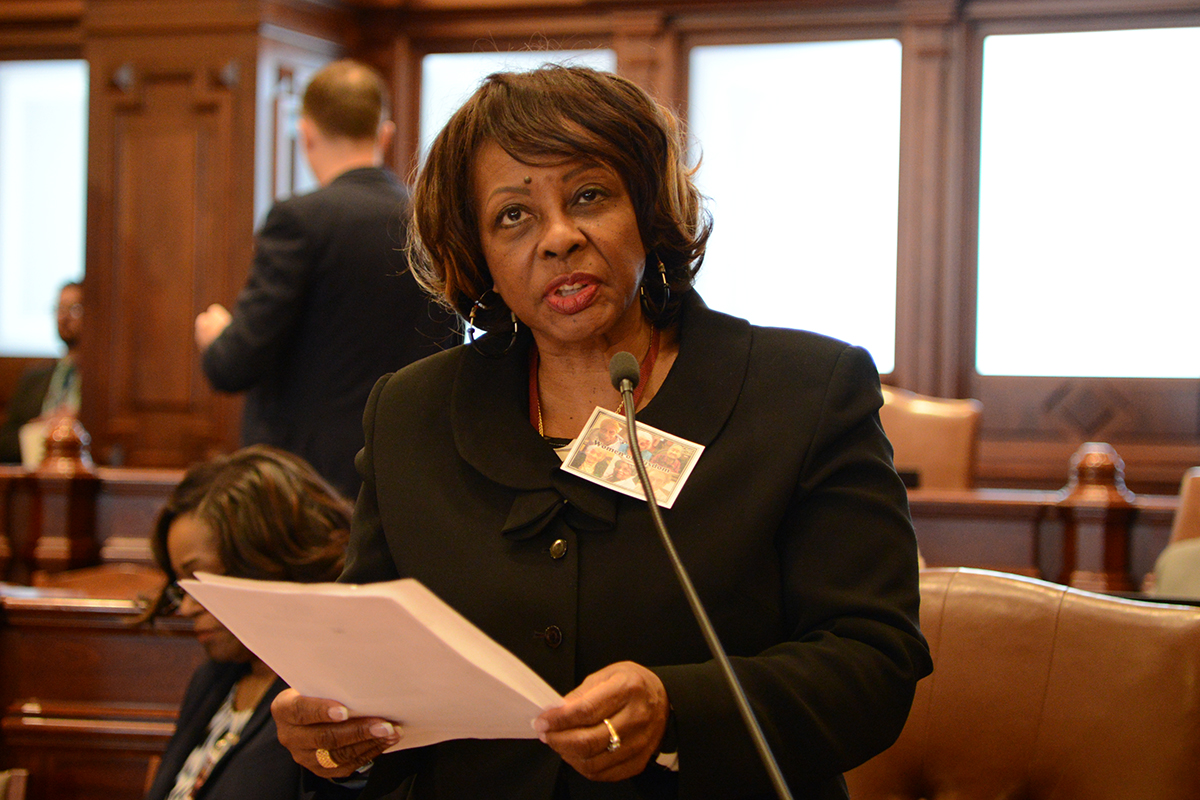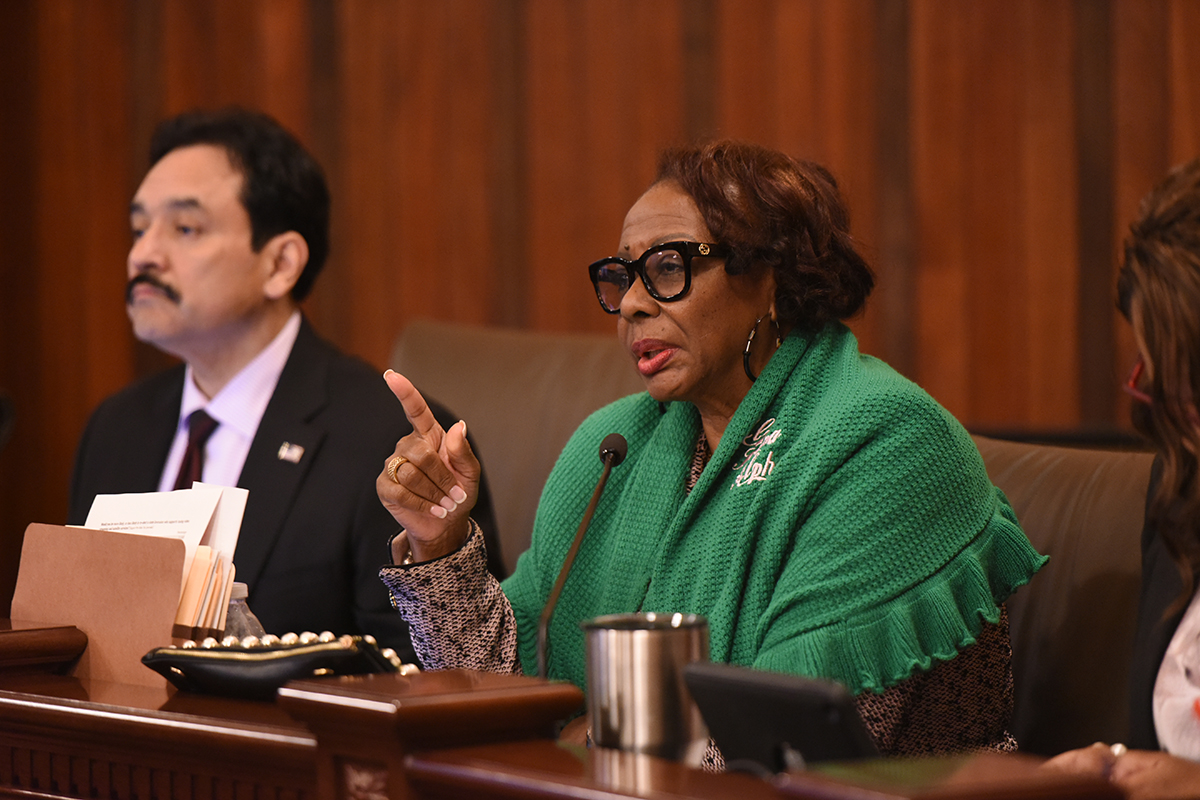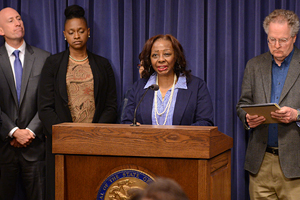Hunter advances plan to support McCormick Place expansion
- Details
- Category: News

“The conventions, conferences, meetings and events held at McCormick Place every year drive a significant amount of economic activity for Chicago and the state,” Hunter said. “With its vast footprint and capacity, it attracts millions of visitors each year and generates millions of dollars in spending.”
Governed by the Metropolitan Pier and Exposition Authority (MPEA), McCormick Place is the largest meeting facility in North America and is composed of four convention centers in downtown Chicago that includes the Lakeside Center and the North, South and West Buildings.
Hunter sponsored Senate Bill 485 to allow the MPEA to borrow an additional $600 million, increasing its bond limit to $3.45 billion, to finance renovations and new construction projects. The authority intends to tear down the above-ground portion of the Lakeside Center and build a new convention hall over King Drive.
The project would be paid for by expanding the restaurant tax zone within which the MPEA collects a 1% tax on food, beverages and alcohol sold.
Hunter: Legalizing cannabis will help reverse decades of unfair, unjust failed policy
- Details
- Category: Uncategorised

House Bill 1438 would allow Illinois residents to possess up to 30 grams of cannabis, 5 grams of cannabis concentrate or 500 milligrams of THC in a cannabis-infused product. The bill also allows for adults 21 and older to grow up to five medical cannabis plants in their home, providing certain conditions are met.
“Communities of color in Illinois have been disproportionately impacted by misguided cannabis policy for far too long,” Hunter said. “I supported the legalization of adult-use cannabis in our state to help address the disproportionate impact of prohibition on people of color by expunging criminal convictions and promote equitable participation in the legal marijuana industry by investing in the communities hardest hit by the War on Drugs.”
Under the bill, cannabis convictions would be expunged in two ways. Convictions for use up to 30 grams would be pardoned by the governor, and state’s attorneys or individuals can petition the court to vacate convictions for amounts between 30-500 grams.
Hunter announces affordable housing tax credit for Lawson House
- Details
- Category: News
 SPRINGFIELD – Federal tax credits that aid in construction or renovation of affordable housing will flow to a project totaling 400 units in the north side of Chicago, State Senator Mattie Hunter announced today.
SPRINGFIELD – Federal tax credits that aid in construction or renovation of affordable housing will flow to a project totaling 400 units in the north side of Chicago, State Senator Mattie Hunter announced today.
“As more Illinoisans become rent burdened, meaning they pay more than 30 percent of their income for housing, this award is an important step toward tackling the growing affordability problem for Chicago’s renter households,” said Hunter(D-Chicago), who chairs the Senate Special Committee on Housing.
Lawson House in Chicago is one of 25 Affordable Housing Developments receiving the federal tax incentive. With this award, Holsten Real Estate Development will undertake a comprehensive rehabilitation of the historic building, resulting in 400 units, the majority targeted to those at or below Area Media Income (AMI). After the completion, Lawson House will still offer office and programming spaces for the various social service providers who currently work with tenants.
The Low-Income Housing Tax credit provides a tax incentive to construct or rehabilitate affordable rental housing for low-income households. It has created more than 90,970 units in the state, generating $4.9 billion in private capital for affordable housing.
In total, $28 million in federal Low-Income Housing Tax Credits will be awarded to 16 different counties across Illinois.
“I am thrilled that Lawson House is going to get the necessary funding it needs to rehabilitate and create more affordable housing units for the community,” Hunter said, “but I remain committed to finding more comprehensive and innovative solutions to the affordable housing crisis in our state.”
Hunter calls for more investments in affordable housing to create stronger communities
- Details
- Category: Uncategorised
 SPRINGFIELD–State Senator Mattie Hunter (D-Chicago, 3rd) joined community leaders and affordable housing advocates from across Illinois at the State Capitol today in calling for more investments in affordable housing in the capital budget.
SPRINGFIELD–State Senator Mattie Hunter (D-Chicago, 3rd) joined community leaders and affordable housing advocates from across Illinois at the State Capitol today in calling for more investments in affordable housing in the capital budget.
“Right now, we have an opportunity – one that has not come around in more than a decade – to make a sizable impact on the affordable housing needs of our communities,” said Hunter, the Chairman of the Senate’s Special Committee on Housing. “There are neighborhoods in my district that are still struggling to recover from the economic crisis and are starved for investment, and I know that many communities across the state from urban, suburban and rural communities face similar challenges.”
Last week, Gov. JB Pritzker proposed investing $175 million for affordable housing in the capital budget. Hunter unified with a coalition of housing developers, supportive housing providers, municipal government and community-based organizations to urge the General Assembly to expand on this foundation by allocating additional funds to create stronger communities by expanding access to safe, decent and affordable housing.
More Articles …
Page 92 of 143


